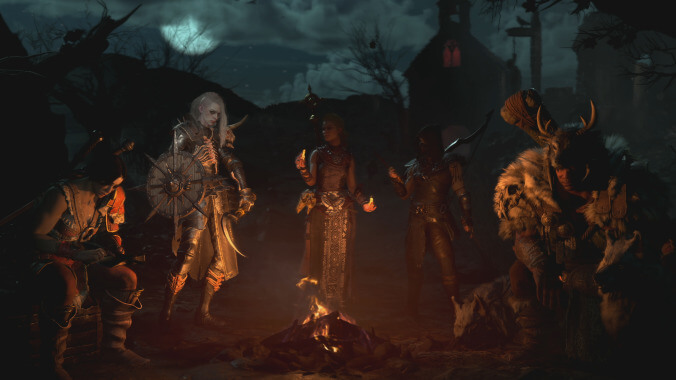They know me in Nevesk by now.
See, I’ve gone and gotten myself hooked on Diablo IV’s Hardcore mode, i.e., the version of Blizzard Entertainment’s new action-RPG that deletes your character the moment that you die, even a single time, even if you beg it not to. I have done this, despite the fact that my non-Hardcore runs through the game during its review period saw me die sometimes upwards of 15 times on just one of its nastier bosses, which would suggest that I am not very good at Diablo IV, and certainly not good enough to be engaging in hyper-punishing challenge modes that can flush hours of my life down a toilet with a single dumb mistake. But there’s a reason I’m subjecting myself to this: I’m an idiot.
But also: I’ve never really liked the casual way the Diablo games handle death, where you can throw yourself at a fight over and over again, losing nothing but (in Diablo IV’s case) some durability from your gear that’s just a quick Blacksmith trip away from fixing. There’s a serious danger in these games, inherent to their formula, of the core gameplay being sucked into a mindless kind of waterslide, a consequence-free grind that’ll take you to the endgame regardless of how you play. It can make it damn hard to feel like any of the choices I’m making while playing the game actually matter.
My choices in Hardcore mode matter—if only in a strictly punishing sense. If I put together an underpowered set of skills? Dead, character deleted, back to Nevesk. Get cocky and try to tackle a dungeon above my level? Corpse time, back to Nevesk. Neglect my gear upgrades? Express train back to Nevesk. It’s frustrating, sure. But it’s also engaging: I can’t sleepwalk through the game, when one moment of mindless grinding can turn into losing an hour or three of progress. It’s the same sense of tension that makes Roguelike games so invigorating and rewarding, an imposing of stakes that’s refreshing my time with a game I’ve already spent some 40 hours with.
At the same time, it’s deepening my understanding of Diablo IV—not least of which because I’m having to roll through the different character classes with some regularity, as my various doomed soldiers get chewed up by the legions of hell. I know a more now about how to build a Druid or Rogue for survivability, for instance, rather than just counting on the grind to carry me forward. (Not a lot more, mind you, although I have learned that if you see a giant demon called “The Butcher” hanging out alone in a dungeon room, it’s probably a damn fine reason to vacate.) That deeper understanding of the game is its own reward—which is good, because the only other reward I’ve gotten from my Hardcore addiction has been a consistent and regular kick to the teeth.
In my review of Diablo IV, I wrote about its surprising interest in having its players think while playing it, thanks to an increased focus on character movement, dodges, build options, and more. Hardcore Mode feels like the natural outgrowth of that idea. It is, in many ways, a better game than the base mode of Diablo IV—not because it’s harder, but because it creates a version of the game where the things you do actually carry weight.

